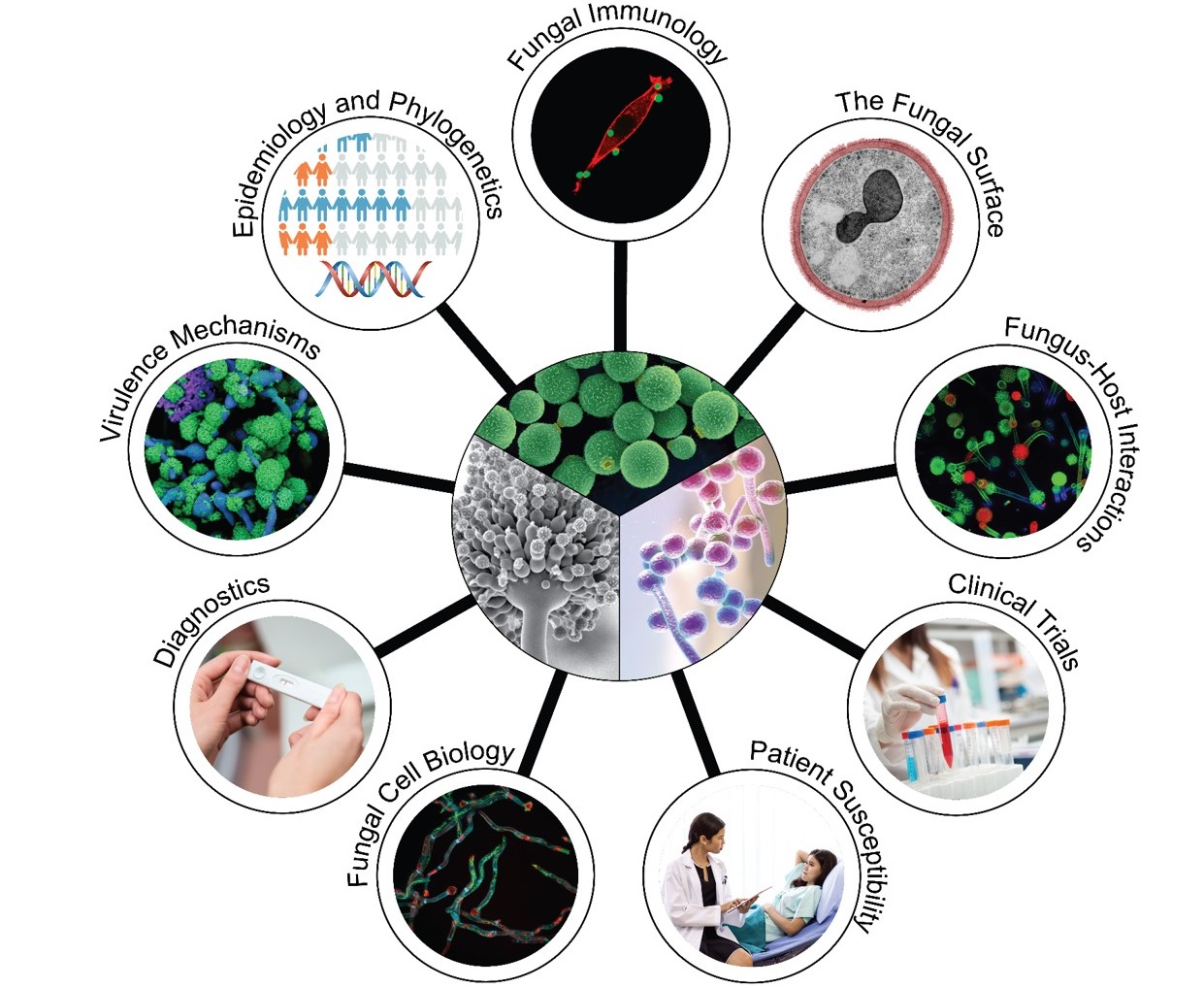Microbes & Society @ Exeter Network aims to promote innovative transdisciplinary collaborations that address the impacts that microbes have on society and that society has on microbial communities.
Research in the MRC CMM refocused existing synergies within the Centre into 5 key themes, generating integrated cross-disciplinary programmes of research that address the major challenges facing this field.
About our research
Research Themes:
- Fungal growth, adaptation and morphogenesis in the context of human infections, and implications for immunity, disease phenotypes and therapy.
- Fungal components as antifungal drug targets, diagnostics, vaccine antigens and adjuvants.
- Evolution and impact of antifungal drug resistance, and mitigation strategies.
- Host-fungus interactions and key mediators of disease establishment and progression at molecular, cellular and organismal levels.
- Determinants of patient susceptibility, including immunity and co-morbidities, to enable directed diagnosis, treatment and prevention of fungal disease.
The major challenges
Despite their huge impact, fungal infections remain understudied and under-diagnosed compared with other infectious diseases and there is a pressing need for more research in this field. The creation of the MRC CMM has represented the most ambitious strategic investment in UK medical mycology, taking advantage of, expanding and strengthening the critical mass we have already developed, and injecting much needed resource and capacity in this important field. Moreover, the creation of the MRC CMM has helped to raise the awareness of this important area of infectious disease research in both academia and the general public. Research in the MRC CMM addresses the three clinical areas that require urgent attention:
| Diagnostics | Major shortcomings in current techniques for diagnosing invasive fungal diseases represent one of the greatest challenges facing the field. Although identification of some infections is relatively straightforward (for example, the detection of cryptococcal antigens using a new dipstick test), the diagnostics available for most fungal infections (culture-based methods, polymerase chain reaction-based assays, fungal antigen detection, imaging modalities) suffer from a lack of specificity, sensitivity, or ability to inform clinical decisions at the point-of-care in various situations. These complexities, combined with subtle clinical presentations, often result in delayed diagnosis and therapy, compromising clinical care. Thus, there is a pressing need for robust, rapid, simple, and cheap diagnostics to facilitate quicker and targeted implementation of antifungal therapy. |
|---|---|
| Antifungal drugs | Only one new class of antifungal drugs has been licensed in the last 10 years (the echinocandins). Along with third-generation triazoles (voriconazole, posaconazole and isavuconazole), echinocandins have improved therapeutic options for many fungal infections. Yet these antifungal drugs have only had modest success in reducing the high mortality rates associated with these systemic diseases. In part, this is due to delays in fungal identification and disease diagnosis. Current antifungal drugs are expensive (the global antifungal drug market is expected to be worth $13.9 billion by 2018a) and they can suffer from restrictions in administration route, spectrum of activity, and bioavailability in target tissues. Further complications of current antifungal options include the lack of broad spectrum activity, toxicity, undesirable drug interactions, and the recent emergence of drug resistance. The close evolutionary relationship between fungi and humans has constrained target selection for drug discovery and development, and many clinically used antifungal drugs are fungistatic rather than fungicidal. Thus, there is a need to gain a greater understanding of the mechanisms of antifungal drug resistance and tolerance, to identify new targets for drug development, and to develop new drugs and drug screens that have the potential to yield fungicidal compounds that overcome the various deficiencies described above. |
| Antifungal immunity | The susceptibility of immunocompromised hosts to fungal infection has led to an increased effort to improve our understanding of antifungal immunity, with the anticipation that such knowledge will offer opportunities for development of vaccination strategies and adjunctive immunotherapies. Important insights have been made, such as the discovery of the C-type lectin immunity. There have also been significant advances in our understanding of the contribution of adaptive immunity in antifungal host defence. For example, Th17 immunity, originally identified in the context of autoimmune disease, is now recognised as playing an essential role in mucosal antifungal immunity. This growing knowledge has already led to trials of novel immunotherapies, such as adjunctive interferon-γ treatment for HIV-associated cryptococcal meningitis. However, there is much we still do not understand. For example, we know relatively little about the underlying mechanisms that initiate and control protective host immunity or the impact of fungal microevolution and microadaptation on host immune responses during infection. Moreover, most of our knowledge relates to invasive infections by the major pathogens, described above, and we still have a poor understanding of the immunopathological processes of other fungal pathogens or common non-invasive fungal infections, such as vulvovaginal candidiasis. The potential roles of fungi (both commensal and pathogenic) in the immune pathology of inflammatory and autoimmune diseases, such as asthma, Crohn’s disease, sarcoidosis, colitis, and arthritis, are still largely unexplored. In addition, there are no antifungal vaccines in clinical use. Thus there is an urgent need to improve the understanding of host antifungal immunity and for better translation of this knowledge into adjunctive immunotherapies, including the development of effective vaccines. |
Our ability to tackle these urgent challenges is considerably constrained by a worldwide lack of capacity in basic and clinical mycology. This is reflected in the modest number of funding applications in medical mycology, when compared to other infectious diseases. Establishing an MRC Centre in Medical Mycology has provided an opportunity to increase capacity in this field in the UK, as well as focus national and international attention on this important area of infectious disease.

